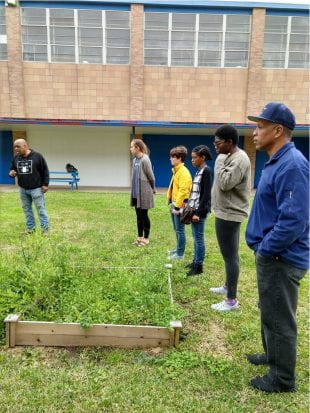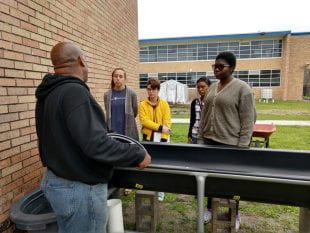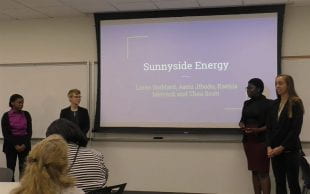Former Sunnyside landfill site to become one of the largest urban solar farms in Texas
One of the largest urban solar farms in Texas will be built on the site of a landfill in Houston’s Sunnyside neighborhood under a proposal developed with the help of a team of Rice undergraduate students.
The landfill, a 240-acre eyesore of unmaintained property leaking methane, will be transformed into a project generating enough electricity for 12,000 homes and providing power discounts for low-income residents.

The team visited Attucks Middle School to observe how the students are taught to use aquaponics to grow plants. This system became the model for the Sunnyside Energy Project’s Aquaponics Hub.
Rice students collaborated with Dori Wolfe, founder of Wolfe Energy, as part of a class on energy and the environment led by professor Daniel Cohan.
“The class is meant to be interactive and open-ended just as the real world is,” said Cohan, an associate professor of civil and environmental engineering at Rice. “It’s so gratifying to see students go beyond just crunching numbers and actually to see how their ideas could be carried into practice and to see the real challenges of what it’s like to work in the energy industry and solving problems that agencies are currently working on.”
In August, C40 Cities announced Wolfe Energy will lead the Sunnyside Energy Project, which aims to achieve carbon-positive status by its fifth year. The Sunnyside Energy Solar Farm, a large-scale array of approximately 70 megawatts complete with bioretention areas, will include an integrated biking and walking path, an electric vehicle charging station and battery backup to the Sunnyside Community Center.
The project will also include an agricultural hub and training center as well as land set aside for a community-driven aquaponic greenhouse. Sunnyside Community Solar will provide local solar energy for homes and businesses and the Sunnyside Energy Trust will include a local board of trustees to project decisions and manage funds raised in part through an annual allocation from the solar farm.
Working on this project fit right in with Cohan’s course, which explores the physical principles of energy use and its impacts on Earth’s environment and climate.

The student team went out and engaged with the Sunnyside community to figure out what they wanted in the new site.
“A central component of the course is to have students work on a business plan challenge that is provided by a mentor in which they have to create a solution for a real-world challenge that would impact both the environment and an organization’s financial bottom line,” Cohan said. “I look to bring in community mentors from a variety of backgrounds with a wide range of challenges and opportunities for students.”
Cohan’s students have previously worked with Houston METRO on an issue involving an electric bus fleet, a local solar developer on locating and financing a solar farm and a pipeline company incorporating renewable energy into a natural gas pipeline. Mentors pitch their projects early in the semester, and students rank their preferences.
Wolfe, who was serving as a mentor for the first time, posed a real-world challenge with a tight deadline. She needed support creating the Sunnyside proposal for C40 Cities’ Reinventing Cities Competition, an effort to drive carbon-neutral and resilient urban regeneration around the world. The competition challenged groups to transform empty plots, abandoned buildings, historical mansions, underused car parks and former industrial sites in a dozen cities.
Loren Goddard, Aanu Jibodu, Ksenia Metruck and Thea Scott were the students who worked with Wolfe throughout the semester — meeting in person, conducting site visits and staying in touch with conference calls.
“The students worked on the exact areas I needed help with,” Wolfe said. “They were able to provide tremendous support for the community engagement portion.”
Metruck focused on the energy requirements and sustainability of the aquaponic greenhouse and farming practices. Goddard worked on the business plan for the agricultural hub. Scott worked with community members and legal faculty developing the Sunnyside Energy Trust. Jibodu focused on community engagement, making sure the whole project was beneficial to the community.
“Even though we each had specific parts of the project that we focused on, we collaborated throughout and bounced ideas off each other to make sure our final product was cohesive,” said Goddard, a Hanszen College senior majoring in civil engineering. “Dori really knows how to turn an idea into actuality and her personal initiative and passion made her a great mentor for this project.”
Proposals were evaluated on were how well they met the community’s needs, among other criteria.
“This is a community that has had to deal with a landfill and waste site on their border for decades and has dealt with many problems of environmental justice,” Cohan said. “This team really took it upon themselves to go out into the Sunnyside community and figure out what they actually wanted.”
Wolfe and the Rice team created a proposal that transformed a harmful eyesore into an educational opportunity that will provide the community with cleaner and more affordable power.
“Working on a real-world problem as an undergrad was an exceptional experience, and I’m very thankful to Professor Cohan and Dori Wolfe for making this possible,” Goddard said. “When I heard that the proposal got selected, I wasn’t too surprised because I knew Dori put together a phenomenal final product.”

At the end of the semester, the students present their projects to their mentors and the rest of class.
At the end of the semester, the student teams present their projects to their mentors and their class. They also worked with a coach from the Rice Center for Engineering Leadership to sharpen their presentation and communication skills.
“Sitting back in the audience watching their presentation was a proud-mom moment for me,” Wolfe said. “It was an amazing experience working with them, it was wonderful to watch them present, and they created an excellent report that was included in the final proposal.”
The City of Houston and Wolfe Energy will complete financial and environmental feasibility studies, finalize the design plan with community input and negotiate lease terms for use of the land. The project is estimated to begin in 2021.
Sunnyside Energy is a partnership between EDF Renewables, MP2-Shell and Wolfe Energy.

